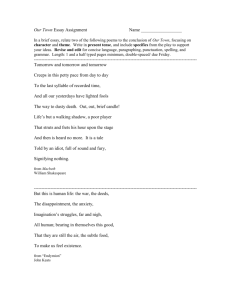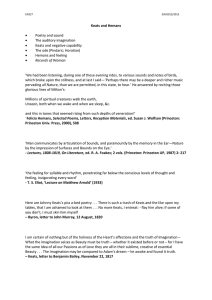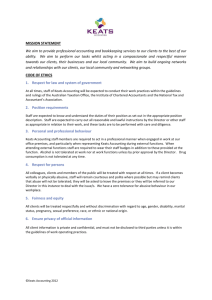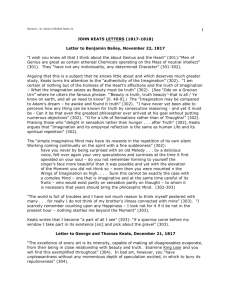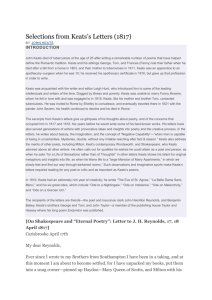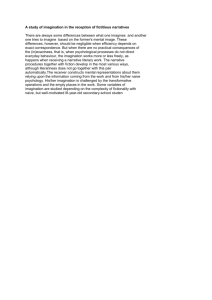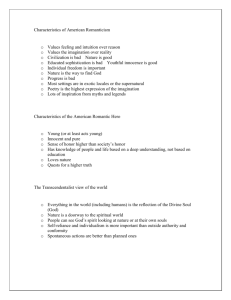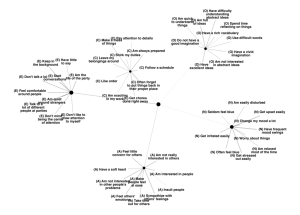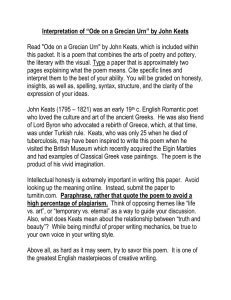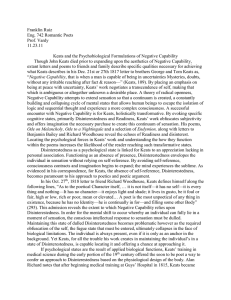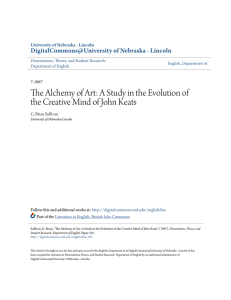LETTERS BY KEATS
advertisement
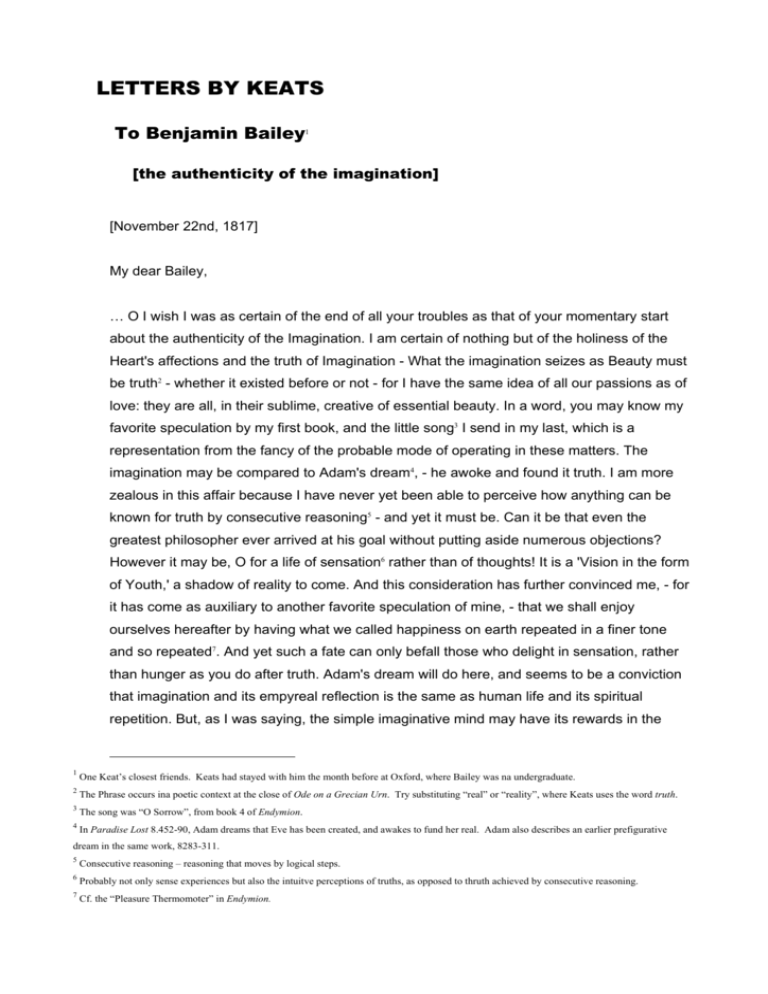
LETTERS BY KEATS To Benjamin Bailey1 [the authenticity of the imagination] [November 22nd, 1817] My dear Bailey, … O I wish I was as certain of the end of all your troubles as that of your momentary start about the authenticity of the Imagination. I am certain of nothing but of the holiness of the Heart's affections and the truth of Imagination - What the imagination seizes as Beauty must be truth2 - whether it existed before or not - for I have the same idea of all our passions as of love: they are all, in their sublime, creative of essential beauty. In a word, you may know my favorite speculation by my first book, and the little song3 I send in my last, which is a representation from the fancy of the probable mode of operating in these matters. The imagination may be compared to Adam's dream4, - he awoke and found it truth. I am more zealous in this affair because I have never yet been able to perceive how anything can be known for truth by consecutive reasoning5 - and yet it must be. Can it be that even the greatest philosopher ever arrived at his goal without putting aside numerous objections? However it may be, O for a life of sensation6 rather than of thoughts! It is a 'Vision in the form of Youth,' a shadow of reality to come. And this consideration has further convinced me, - for it has come as auxiliary to another favorite speculation of mine, - that we shall enjoy ourselves hereafter by having what we called happiness on earth repeated in a finer tone and so repeated7. And yet such a fate can only befall those who delight in sensation, rather than hunger as you do after truth. Adam's dream will do here, and seems to be a conviction that imagination and its empyreal reflection is the same as human life and its spiritual repetition. But, as I was saying, the simple imaginative mind may have its rewards in the 1 One Keat’s closest friends. Keats had stayed with him the month before at Oxford, where Bailey was na undergraduate. 2 The Phrase occurs ina poetic context at the close of Ode on a Grecian Urn. Try substituting “real” or “reality”, where Keats uses the word truth. 3 The song was “O Sorrow”, from book 4 of Endymion. 4 In Paradise Lost 8.452-90, Adam dreams that Eve has been created, and awakes to fund her real. Adam also describes an earlier prefigurative dream in the same work, 8283-311. 5 Consecutive reasoning – reasoning that moves by logical steps. 6 Probably not only sense experiences but also the intuitve perceptions of truths, as opposed to thruth achieved by consecutive reasoning. 7 Cf. the “Pleasure Thermomoter” in Endymion. repetition of its own silent working coming continually on the spirit with a fine suddenness - to compare great things with small - have you never by being Surprised with an old Melody - in a delicious place - by a delicious voice, felt over again your very Speculations and Surmises at the time it first operated on your Soul - do you not remember forming to yourself the singer's face more beautiful than it was possible and yet with the elevation of the Moment you did not think so - even then you were mounted on the Wings of Imagination so high - that the Protrotype must be here after - that delicius face you will see. What a time! I am continually running away from the subject - sure this cannot be exactly the case with a complex Mind - one that is imaginative and at the same time careful of its fruits - who would exist partly on Sensation partly on thought - to whom it is necessary that years should bring the philosophic Mind - such an one I consider your's and therefore it is necessary to your eternal Happiness that you not only drink this old Wine of Heaven, which I shall call the redigestion of our most ethereal Musings on Earth; but also increase in knowledge and know all things. I am glad to hear you are in a fair way for Easter - you will soon get through your unpleasent reading and then! - but the world is full of troubles and I have not much reason to think myself pesterd with many - I think Jane or Marianne has a better opinion of me than I deserve - for really and truly I do not think my Brothers illness connected with mine - you know more of the real Cause than they do nor have I any chance of being rack'd as you have been - You perhaps at one time thought there was such a thing as worldly happiness to be arrived at, at certain periods of time marked out, - you have of necessity from your disposition been thus led away - I scarcely remember counting upon any happiness - I look for it if it be not in the present hour, - nothing startles me beyond the moment. The setting sun will always set me to rights, or if a sparrow come before my window, I take part in its existence and pick about the gravel. The first thing that strikes me on hearing a misfortune having befallen another is this - 'Well, it cannot be helped: he will have the pleasure of trying the resources of his spirit' - and I beg now, my dear Bailey, that hereafter should you observe anything cold in me not to put it to the account of heartlessness, but abstraction - for I assure you I sometimes feel not the influence of a passion or affection during a whole week - and so long this sometimes continues, I begin to suspect myself, and the genuineness of my feelings at other times - thinking them a few barren tragedy tears. Your affectionate friend, John Keats To John Taylor8 [Keats’s axioms in poetry] [Hampstead, February 27th, 1818 ] My dear Taylor – Your alteration strikes me as being a great Improvement – the page looks much better. *** It is a sorry thing for me that any one should have to overcome prejudices in reading my verses - that affects me more than any hypercriticism on any particular passage - In Endymion, I have most likely but moved into the go-cart from the leading-strings - In poetry I have a few axioms, and you will see how far I am from their centre. 1st. I think poetry should surprise by a fine excess, and not by singularity; It should strike the reader as a wording of his own highest thoughts, and appear almost a remembrance. 2d. Its touches of beauty should never be half-way, thereby making the reader breathless, instead of content. The rise, the progress, the setting of Imagery should, like the sun, seem natural to him, shine over him, and set soberly, although in magnificence, leaving him in the luxury of twilight. But it is easier to think what poetry should be, than to write it - And this leads me to another axiom - That if poetry comes not as naturally as the leaves to a tree, it had better not come at all. - However, it may be with me, I cannot help looking into new countries with 'O for a Muse of Fire to ascend!'9 If Endymion serves me as a pioneer, perhaps I ought to be content - I have great reason to be content, for thank God I can read, and perhaps understand Shakespeare to his depths; and I have I am sure many friends, who, if I fail, will attribute any change in my life and temper to humbleness rather than pride - to a cowering under the wings of great poets, rather than to a bitterness that I am not appreciated. I am anxious to get Endymion printed that I may forget it and proceed. I have copied the 3rd Book and begun the 4th. Your sincere and obliged friend, John Keats 8 Partner in the publishing firmo f Taylor and Hessey, to whom Keats worte this letter while Endymion was being put through the press. 9 Altered from Henry V, prologue, line 1
